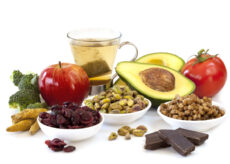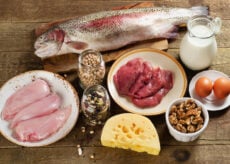Chicken or Beef: Which is Better For Your Health?

The question, Chicken or beef, can be a relatively polarizing. During the low-fat craze—which peaked in the 80s, spread into the 90s, and is shockingly still advocated by some (particularly folks from the Baby Boomer generation) to this day—chicken reigned supreme. However, after being properly educated (fat is not inherently “bad” nor does it make you fat), being told enough times that “it’s what’s for dinner,” and being asked often enough, “Where’s the beef?” beef has made a comeback in a serious way.
Now that protein has become a very prominent topic of discussion, people are becoming more and more aware of its importance in their nutrition plans. Protein is used by our bodies to build and repair tissues, and it provides the building blocks for our muscles, bones, skin, cartilage, enzymes, blood, certain hormones, and more.
When we eat enough protein, it helps keep energy and blood sugar levels stable as it helps support metabolic function. Eating protein-rich foods can also help improve satiety (our feelings of fullness and satisfaction), improve appetite control, reduce cravings, and help us control calorie intake. Over the long haul, eating a high-protein diet can help accelerate fat loss, preserve calorie-burning muscle, prevent weight regain, and preserve metabolic rate.
All this becomes even more crucial as we age, when protein can help preserve strength, muscle mass, function, and mobility. Of course, for those of us who are active (which is hopefully everyone), protein helps promote recovery and how we look, feel, and perform.
So, what makes one food a better source of protein than another? On the most basic level, we have to look at “protein quality,” which refers to the balance of amino acids, the digestibility of the protein, and the capacity of the food to provide essential amino acids.
Our bodies are able to create a number of amino acids on their own from other amino acids. There are others (called “essential”), which our bodies are unable to produce. So it’s essential for our survival to ensure we consume them. Unlike most plant proteins, animal products, such as chicken or beef, which contain all the important amino acids (and are thus referred to as complete proteins), rank highest in terms of protein quality.
Chicken or Beef Comes Down to the Source
Before going any further, it’s important to look at where your meat comes from. How an animal is raised and cared for can have a significant impact not only on the quality of life for the animal itself but on the nutritional profile of the meat, dairy, or eggs it produces. After all, you are what you eat, right? The same is true for animals.
For example, pasture-raised animals with plenty of access to fresh grass and sunlight yield food products with significantly higher levels of omega-3 fatty acids than animals that are crowded together living in “factory” conditions. In fact, meat (and dairy) from pasture-raised animals contains about 50% more omega-3 fatty acids than animals from a feedlot (which are fed a mixture of grains, including omega-6 rich soy and corn).
Foods from pasture-raised animals also provide more CLA (or conjugated linoleic acid), which has been shown to improve body composition, enhance immunity, and promote a healthy inflammatory response. In addition, pastured chickens are less likely to carry unhealthy bacteria (though it’s still very important that you follow proper preparation methods with any animal products and ensure your meat is cooked to appropriate temperatures).
Animals that live with less stress have also been found to provide higher levels of nutrition. There are additional quality concerns when it comes to food products from feedlot animals, which are likely to be fed GMO crops, pumped full of chemicals to avoid sickness, and crammed together with no room to even walk, will produce a lower quality product.
Quite simply, quality matters. Seek out chicken or beef from animals that have been raised as humanely as possible and purchase organic meat whenever possible. Even better, purchase from a local farmer who truly cares for his or her animals and provides them with plenty of access to grass, sunlight, and room to roam.
The Benefits of Chicken
Chicken is a very popular protein source, especially among the fitness crowd. Why? Because it’s versatile, lean, economical, high in protein, lower in calories than beef, and easy to prepare. All in all, chicken is an efficient, concentrated source of protein, providing up to 35 grams per 4-ounce (cooked) portion.
Chicken is a complete source of protein, providing all the amino acids, including more than 2 ½ grams of the all-important amino acid leucine, which is important for improving body composition, recovery, and performance. Chicken is also a good source of several vitamins and minerals such as vitamins B3, B6, and B12, pantothenic acid, phosphorus, selenium, zinc, copper, magnesium, and iron. Finally, it’s a quality source of choline, which plays an important role in brain health and cognitive function.
Benefits of Beef
Beef has been enjoying a resurgence since we’ve discovered that fat is not, in fact, evil. Formerly looked down upon because even the leaner cuts contain more fat than chicken, we’re now rediscovering that beef fat may provide more benefits than originally believed.
Beef, it turns out, provides both saturated and monounsaturated fats and an interesting saturated fat known as stearic acid, which may actually help prevent arterial clotting. It’s also a very healthy source of CLA and omega-3’s. (Remember to choose organic, pasture-raised, grass-fed, etc., for the highest levels of these healthy fats.)
In addition to being a high-quality source of protein, beef also supplies high levels of iron (in its most absorbable form), selenium, zinc, potassium, vitamin B12 (which supports energy levels and brain health and helps clear out potentially toxic compounds), niacin, vitamin B6, riboflavin, and choline. Oh yeah, and while individual differences apply, most people with taste buds would agree that beef is pretty darn tasty too.
Who wins? Chicken or Beef
At the end of the day, it’s a matter of taste. Yeah, I know…it’s a bit anticlimactic. But both beef and chicken are high-quality sources of protein and a variety of nutrients.
What’s really important (instead of deciding between chicken or beef) is that you enjoy a variety of proteins, including chicken and beef, dairy products (such as whey), and quality plant proteins (like spirulina, nuts, and seeds). And perhaps what’s really MOST important is that when it comes to protein, quality really does matter.






